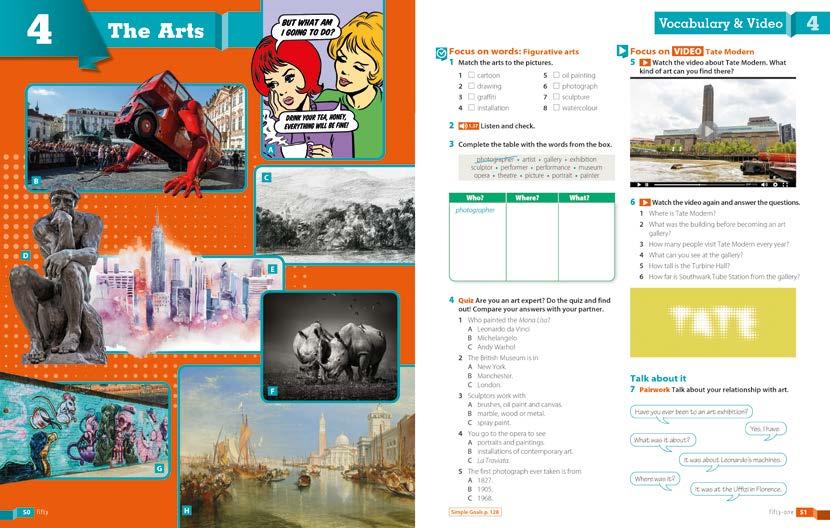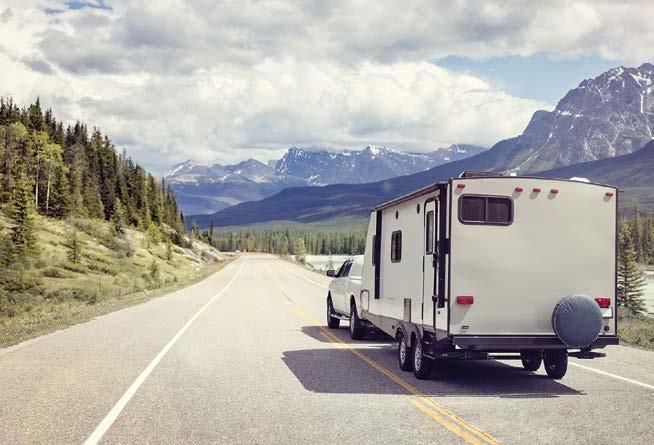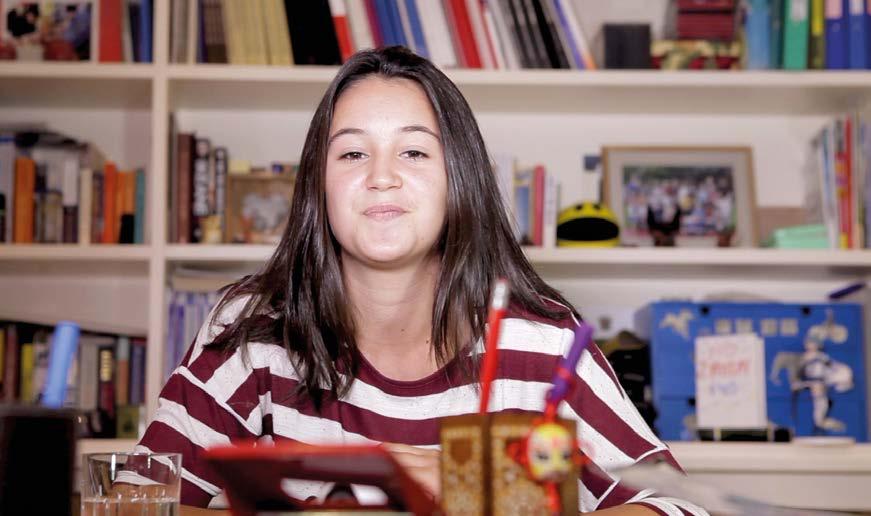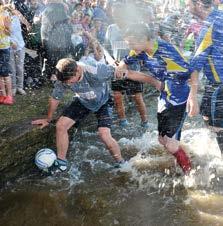Audrey Cowan
Catrin E. Morris
Paola Tite



Audrey Cowan
Catrin E. Morris
Paola Tite





• VOCABULARY & COMMUNICATION VIDEOS
• INCLUSIVE ENGLISH REVISION SECTION
• LIFE SKILLS & MEDIATION ACTIVITIES


Audrey Cowan
Catrin E. Morris
Paola Tite
The pleasure of learning
Vocabulary & Video
The unit starts with the vocabulary presentation to practise the new words. The VIDEO will allow you to see the new words in a communicative context, helping you with the comprehension.

Reading & Dialogue Work:
4 pages to present the language, practise and produce with the Write and Talk about it activities
• an original text with the language presentation of the unit

Focus on dialogues:
• a group of friends faces situations and typical teenage issues of your age
Simple Goals
Refers to the inclusive English section
Let’s All Revise at the end of the units.
Focus on communication:
• presentation and exercises on real communicative functions

• grammar presentation schemes with references to the Digital Grammar Bank
• exercises presented by grade of difficulty

• a page focused on communication and oral production, animated by interesting and engaging VIDEOS

DIGITAL BOOK
Student’s Book and Workbook in a digital version with interactive exercises, audios and videos. You can activate the karaoke option in the dialogues and the subtitles option in videos and import documents, images or links. Thanks to the additional resources, you can improve your knowledge of the English language and the English-speaking world.
Resources
• Digital Grammar Bank
• Picture Dictionary

• Insights into culture and current affairs with activities focusing on language skills
• Key : preparatory activities for international certifications
• Competences box with strategies and recommendations to develop language skills
• Phonics poster with audio
• Maps of the United Kingdom, the United States and the English-speaking world
• Flashcards
• Complete recording scripts
• Complete video scripts

1 Holiday Time
Holiday places
Holiday equipment
VIDEO Dream holidays
Expressing interest or surprise
Past participle
Present perfect been or gone
Present perfect or Past simple?
ever and never
Pronunciation
Sentence stress 2 Technology
Verbs about technology
Computer parts
Social media
VIDEO Computer parts
Making suggestions (2)
Expressing agreement and disagreement (2)
Present perfect with for and since
Present perfect with just, yet, already
Pronunciation have – weak and strong forms
Inviting be going to – plans and intentions some, any, no, every compounds
Pronunciation
The letter /y/
Artistic movements
VIDEO
Making offers and promises
The future with will will or be going to? shall
VIDEO My best holiday ever
Speaking
Giving a presentation
Reading
Understanding a text about staycations
Listening
Understanding two kids talking about geocaching
Writing
Writing a travel report
Speaking – Oral Presentation
Presenting your travel blog to the class
Mediating Communication
Interpreting
VIDEO Have you posted a photo yet?
Speaking
Doing an interview
VIDEO What are you going to do?
Speaking
Describing your holidays
VIDEO You’ll win the lottery
Speaking
Playing to predict the future
Reading
Understanding kids talking about movies
Listening
Understanding an online tutorial
Writing
Writing an instruction manual
Speaking – Oral Presentation
Presenting your ‘how to’ guide to the class
Mediating Concepts
Collaborating in groups
Reading
Understanding a film review
Listening
Understanding a boy talking to his friend
Writing
Writing a post for a blog on teenager issues
Spoken Interaction
Talking about typical teenager issues
Mediating a Text
Relaying key points from an online post
Reading
Understanding a text about London free museums
Listening
Understanding a boy talking about his favourite painting
Writing
Writing a presentation
Speaking – Oral Presentation
Presenting a work of art to the class
Mediating a Text
Summarising
5 Wild World
64
6 Festivals
76
The natural world and landscape
The environment
VIDEO The natural world
Entertainment
Adjectives ending in -ed and -ing (2)
VIDEO Glastonbury Festival
Expressing certainty and possibility
Zero conditional
First conditional will, may, might
Pronunciation
Silent letters
Town and city
Geographical features
VIDEO Life by the seaside
Expressing feelings and opinions
Past continuous
Past continuous and Past simple with when and while
Describing places Making comparisons Quantifiers Comparatives and superlatives
VIDEO Remedies
Asking for and giving advice must, mustn’t, have to should, shouldn’t, could
VIDEO Reduce, reuse, recycle!
Speaking
Making a presentation on an environmental topic
VIDEO Something strange happened
Speaking
Telling a story
VIDEO It’s better for the environment
Speaking
Discussing dream houses
VIDEO Everyone should learn first aid
Speaking
Discussing two case studies
Reading
Understanding an article on the Goldman Prize
Listening
Understanding an interview on the World Environment Day
Writing & Mediating Concepts
Making an awareness poster about an event in favour of the environment
Spoken Interaction
Discussing the World Environment Day
Reading
Understanding descriptions of British festivals
Listening
Understanding a boy who describes an event
Writing
Describing an event in an email
Speaking – Oral Presentation
Presenting an artistic event to the class
Mediating Communication
Interpreting
Reading
Understanding an article about life in the Arctic
Listening
Understanding a dialogue about a story
Writing
Writing an opinion essay
Spoken Interaction
Talking about your opinion essay
Mediating Concepts
Collaborating in groups
Reading
Understanding different texts about physical activities
Listening
Understanding a girl who gives some advice
Writing
Writing a for and against essay
Speaking – Oral Presentation
Presenting your essay
Mediating a Text
Summarising

Focus on pictures
1 Look at the picture and write all the words that come to your mind in five minutes. Then answer the questions.
1 What can you see in this picture?
2 Can you give a physical description of the people in the picture?
Focus on words: Revision
2 Mind map Complete the mind map about yourself.
3 Can you describe what they are wearing and doing?
3 Don’t get lost In pairs, look at the map and decide where you want to guide your partner. Give him/ her directions. Exchange roles and try again.

4 Grammar quiz Find the examples in five minutes!
1 two examples of subject pronouns
2 two examples of possessive adjectives
3 two examples of frequency adverbs
4 two examples of object pronouns
5 two examples of prepositions of movement
6 two examples of prepositions of time
7 two ways of talking about the future
8 two examples of modal verbs
5 Grammar quiz Complete the sequences. big, bigger, biggest 1 cheap, , 2 old, , 3 nice, ,
7 Grammar quiz Find the odd one out. Can you explain why?
watch, wash, kiss, play
The verb ‘play’ adds -s to the third person singular while the other verbs add -es. 1 he’s, she’s, it’s, his 2 who, which, did, how 3 we, they, her, I 4 sell, work, ride, give
8 1.2 Follow the instructions and write the dialogue. Then listen and check.
Ask her what she did yesterday evening.
Reply that you saw a science-fiction film.
Ask if she liked it.
Reply you liked it, but that it was not interesting enough.
Ask what the best science-fiction film is in her opinion.
Answer Star Wars is the best science-fiction film.
Ask if she has to do her Art homework.
Reply that you have to do Art and also French homework.
Tell her you did them yesterday evening and ask her if she needs any help.
6 1.1 Listen and check.
Answer that your father teaches Art at the university and your mother is French, then thank him and say that you don’t need his help.
Vocabulary
1 Key Choose the correct option (A, B or C).
1 When we went to Paris last year we had to speak all the time.
A France B French C The French
2 Katherine, Uncle Tom’s daughter, is my favourite
A nephew B niece C cousin
3 I don’t have time to my bedroom. My dad does it for me.
A tidy B wash C make
4 I my teeth three times a day, after every meal.
A brush B wash C make
5 It’s too hot to wear long .
Why don’t you put your shorts on?
dress
2 Complete with similar words to those given.
1 Albanian, Finnish, Greek, .
2 bathroom, bedroom, living room,
3 cheese, bread, meat, .
4 supermarket, hospital, post office,
5 lake, river, mountain,
6 train, aeroplane, coach,
3 Complete the words.
1 A family member: u
2 A piece of furniture: t
3 A drink: c
4 A sport: r
5 A part of the body: s
6 A piece of clothing: j
7 A kind of housework: w - u
8 A job in the hospital: n
9 A means of transport: p
4 Find the odd one out.
1 Good morning, Good afternoon, Good luck, Good evening
2 red, green, brown, beard
3 collect stamps, go to work, read a book, watch a football match
4 taxi, bus, station, ferry
5 baker’s, shoe shop, newsagent’s, library
5 Choose the correct function (A, B, C or D) for each statement.
1 He’s tall, dark and handsome.
A making comparisons
B talking about ability
C describing people
D describing feelings
2 Of course you can ride my bicycle.
A giving permission
B talking about ability
C asking for something
D talking about routines
3 Are you taller than your brother?
A describing feelings
B explaining rules
C talking about possibility
D making comparisons
4 She first came to this town five years ago.
A talking about past events
B giving directions
C describing people
D making comparisons
5 You mustn’t use your mobile during the lesson.
A talking about routines
B describing experiences
C explaining rules
D talking about how you do things











Focus on words: Holiday places
1 1.4 Match the words to the pictures. Then listen, check and repeat.
5 Watch the video without sound and write at least 4 holiday places you see. Check them with your partner: are they the same?
2 Now find the following details in the pictures.

3 Put the words from exercises 1 and 2 in the correct column. Can you add any more to the lists?
4 Extension Do you remember the words for the means of transport? Write at least two words in each bubble of the word web.
6 Watch the video again. Olly is talking about holidays. Match the places on the left to the expressions on the right.
mountains
a ◻ It’s lots of fun.
b ◻ It’s cold and boring.
c ◻ That’s cool!
d ◻ It sounds great.
e ◻ I don’t fancy it.
f ◻ Not my dream holiday.
Talk about it
7 Pairwork Use the expressions from exercise 6 to talk about your dream holiday.
Where do you like going on holiday?
Where do you usually stay?
Do you like activity camps?
We usually stay in my uncle’s house. I like going to the mountains.
Yes! They’re great!
1 1.5 Listen and read the reviews of the best holidays according to five teens. Write the title of each review.
Activity camp • B&B • Glamping • House swap Staycation

1 by Saskia
I’ve camped lots of times with my family, but I've never been Glamping before! Glamping is glamorous camping. It’s like camping because you sleep in a tent in the countryside, but it’s much better. We slept in a comfortable bed in a tent that was up when we arrived at the campsite, and there was a barbecue ready to cook your food on!
2 by George
Last summer I visited Edinburgh for the first time. We stayed with Yourbnb, a company renting people’s rooms, flats and houses online. Every morning we had breakfast at home, made sandwiches for lunch and then explored the city. We had so much fun we’ve decided to do it again next year!

swap New Words
3 by Becky
Have you ever had a staycation, when you stay at home for your holiday? I have, this summer in London with my friends. We had a great time! We swam and sunbathed at the city’s Lidos, rode London’s free bikes, saw free films and exhibitions. It was the best holiday I’ve ever experienced and it was free!
4 by Jamie


I spent the summer on the beach, because my family swapped our house in the Cumbrian mountains for another family’s house on the South Coast in Cornwall. We stayed at hotels in the past but never in a family house. I prefer it because it feels more like home! I had a great time and I sent a lot of postcards to my friends.
5 by Tara
My brother and I have always wanted to go to a summer activity camp, so last summer we spent our holidays at a tourist resort in Spain, with plenty of outdoor activities for teenagers and places to eat, drink and relax for adults. I learned how to dance flamenco and I also bought CDs of Spanish music. The result? We all enjoyed the holiday!

2 1.5 Key Read and listen to the text again. Decide if these sentences are T (True), F (False) or NG (Not Given).
1 Saskia is new to camping.
5 Tara’s family all enjoyed their holiday. campsite rent
2 George has visited Edinburgh many times.
3 Becky’s parents had to work all summer.
4 Jamie lives in the mountains.

3 Read the text again and decide which holiday (1-5)…
A doesn’t cost any money?
B is by the sea?
C is in a city?
D is good for adults and teenagers?
E offers very comfortable beds?
Past participle
Show me. camp ➞ camped go ➞ gone sleep ➞ slept
Underline other examples of Past participle in the text.
4 Find the Past participle of these verbs in the text on page 14.
1 decide 2 have 3 experience 4 want
5 Complete the sentences with the Past participle of the verbs in brackets.
1 Have you (have) a nice day?
2 I’ve never (camp) before!
3 We have (decide) to stay home this summer.
4 You’ve (sleep) all the way here in the car!
5 Sally has always (want) to try glamping.
6 Mum and Dad have (visit) Scotland lots of times before.
Present perfect with ever and never
What’s it for?
We use the Present perfect to talk about past events without specifying when exactly they happened. We use ever in interrogative sentences and never in affirmative sentences with negative meaning. Show me.
Have you ever had a staycation? I’ve never been glamping before!
Underline the other examples of the Present perfect with never or ever in the text.
6 Complete the sentences with ever or never.
1 We’ve stayed at this hotel before.
2 ‘Have you been on holiday to a tourist village?’ ‘No, I haven’t.’
3 This is the best holiday I’ve had!
4 Nick has visited his grandparents in Spain. This is his first time.
5 My little sister has swum with dolphins, she’s really excited!
6 ‘Have you sent a postcard?’ ‘No, I haven’t!’
Talk about it
7 Have you ever…? Ask and answer questions about the following activities some people do on holiday. Are you familiar with them?





8 Pairwork Talk about your holiday experiences. Use the mini dialogues to help you.
Have you ever camped?
Yes, I have. Last… No, I haven’t. Have you ever printed photos?
Focus on words: Holiday equipment
1 1.6 Put these words in the correct column. Then listen, check and repeat the words.
boat • camera • climbing • go on a walking tour guide book • horse riding • sailing • satnav app see a show • go sightseeing • take photographs visit museums
2 1.7 Read and listen to the dialogue. How does Molly feel about Jake’s answers?
1 ◻ surprised 2 ◻ annoyed
Jake Molly, have you finished the questionnaire for the school trip?
Molly Yes, I have. I gave it to our teacher yesterday. Why?
Jake Because I haven’t started it! Can you help me, please?
Molly Sure! Which of these activities have you tried before: horse riding or climbing?
Jake I’ve never tried horse riding, but I went climbing with the scouts last year.
Molly Are you serious? What was it like?
Jake It was a bit scary!
Molly Wow! What about sailing?
Jake Yeah, I’ve been sailing lots of times.
Molly Really?
Jake Yes, my uncle’s got a boat, we go sailing every summer.


Molly OK, next part. Have you ever seen a show, visited a museum or been on a walking tour?
Jake I visited the British Museum last year and I’ve been on lots of walking tours with Grandpa.
Molly Sounds like fun! And have you ever done photography or been sightseeing?
Jake I’m the king of selfies!
Molly No, not selfies! Have you ever taken photos of people and places using a real camera?
Jake Not really, I haven’t got a camera!
Molly Are you kidding?
Jake No, I’m serious! Any more questions?
Molly Just a few. Have you ever used a guide book?
Jake Well, I’ve used my satnav app and Google Maps. Does that count?
Molly You’re hopeless, Jake!
3
1.7 Read and listen again. Match the two parts of the sentences.
1 Molly gave the questionnaire
2 Jake hasn’t
3 Jake thought climbing
4 Last year Jake visited
5 Jake takes
6 Jake has got
a ◻ a satnav app.
b ◻ the British Museum.
c ◻ started the questionnaire.
d ◻ to the teacher yesterday.
e ◻ was a bit scary.
f ◻ a lot of selfies.
4 Read the questions and choose the correct answer (A, B or C).
1 Which of these activities has Jake never done?
A climbing B horse C sailing riding
2 When did Jake go on a trip with the scouts?
A last year B this C two year years ago
3 Who has Jake been on walking tours with?
A his grandfather B his uncle C Molly
4 What has he used to find his way?
A a guide book B a map C an app
Present perfect or Past simple?
What’s it for?
We use the Present perfect to talk about events without specifying when they happened. Otherwise we must use the Past simple. Show me.
I’ve never tried horse riding, but I went climbing last year
Underline other examples of the Present perfect and Past simple in the text.
5 Underline the correct alternative.
1 Last summer we have visited / visited London.
2 We haven’t been / didn’t go to the beach yesterday.
3 My parents have seen / saw this exhibition last weekend.
4 Have you ever stayed / Did you ever stay at this hotel?
5 I haven’t camped / didn’t camp when I was a child.
6 I’ve never used / never used a satnav.
Focus on communication
Expressing interest or surprise
Really?
What was it like?
Wow!
That sounds great / interesting / amazing! (That) Sounds like fun! Are you kidding / serious?
6 Pairwork Take turns to react to the following statements. Add one yourself.
1 I went sailing last summer.
2 I’ve never taken selfies.
3 We went on a ghost tour last night.
4 I’ve driven a car!
5 I’ve never climbed a tree!
6
Talk about it
Put a n for yes and a n for no.
Sports activities
n go horse riding
n go climbing
n go sailing
Cultural interests
n see a show
n visit a museum
n go sightseeing
Abilities
n use a guide book
n find your way
n take photos
7 Pairwork Ask and answer questions to complete the school trip questionnaire. Have you ever been horse riding?


Really? I’ve never been horse riding! What was it like?
Yes, I have. I went horse riding at the summer camp last July. Great fun!
How is it formed? Look: visit ➝ visited decide ➝ decided
➝ had We form the Past participle of regular verbs by adding –ed to the base form of the verb. Irregular verbs have different forms, see the Digital Grammar Bank for the complete list.
How is it formed? Look:
I have started I’ve started I have not started I haven’t started you have started you’ve started you have not started you haven’t started he / she / it has started he / she / it ’s started he / she / it has not started he / she / it hasn’t started we / you / they have started we / you / they ’ve started we / you / they have not started we / you / they haven’t started
Interrogative form
Short answers
Have I started? Yes, you have No, you haven’t Have you started? Yes, I have. No, I haven’t. Has he / she / it started? Yes, he / she / it has. No, he / she / it hasn’t. Have we / you / they started? Yes, we / you / they have. No, we / you / they haven’t.
5 Complete the sentences with the Present perfect of the verbs from the box.
not visit • not try • go • see • take • not decide • find
They’ve been to London many times before.
1 I climbing until now and I think I’m not going to like it.
2 We this show before.
3 He wonderful photos of the canyon. Ask him to show them to you.
4 You the museum. Let’s go now.
5 We the keys! They were in your bag, Mum!
6 They where to go on holiday.
Have you got any suggestions?
6 Write questions and short answers. you / buy / a new bag ? +
Have you bought a new bag? Yes, I have. she / finish / her homework ?Has she finished her homework? No, she hasn’t.
1 I / meet / you before ? –
2 they / miss / the train ? +
3 your sister / win / the race ? –
4 you / understand / the rule ? +
5 Philip / watch / the film ? +
6 we / lose / our money ? -
Look:
Have you ever won the lottery?
She’s never learned how to swim.
We always put ever and never before the Past participle.
7 Add ever and never in the correct position.
Have you ever been to the British Museum? They have never done photography.
1 I’ve spoken to an English person. (never)
2 You’ve used Google Maps. (never)
3 Has he been to South Africa? (ever)
4 We’ve tried climbing Ben Nevis. (never)
5 Have you seen a famous person? (ever)
8
1.8 Reorder the words to make sentences. Then listen and check.
tried / you / sailing / Have / ever / ?
Have you ever tried sailing?
1 ever / in / Have / you / slept / a caravan / ?
2 booked / We’ve / with / never / a flat / Airbnb
3 Has / Sam / to / ever / been / Greece / ?
4 never / I’ve / experienced / a staycation
5 Have / ever / they / a guide book / used / ?
6 My cat / a tree / climbed / never / has
9
Underline the correct alternative.
We’ve before / never been to an activity camp.
1 ‘Would you like to try porridge?’
‘Yes please, I never have / ’ve never eaten it!’
2 ‘Have you ever swum with dolphins?’
‘No, I never / haven’t, but I would like to try.’
3 She’s really scared. She’s ever / never dived before.
4 ‘Have you spoken to my cousin?’ ‘No, I’ve never met / I met him.’
5 They ever have / ’ve never learned English.
6 ‘Have you cook / ever cooked your own food?’ ‘Yes, I have, a few times.’
Look:
She’s been to the beach and she’s really dark now. She’s gone home. She’s there now.
We use been to say that we have been in a place and now we have returned, gone when we have not returned yet.
10
Underline the correct alternative.
Nice shoes! Have you been / gone to the shopping centre?
1 Don’t shout! Dad has been / gone to bed.
2 My English teacher has been / gone to the USA five times.
3 Our parents have been / gone to the cinema. Their car isn’t in the garage.
4 ‘Have you ever been / gone to the theatre?’ ‘No, never.’ been and gone
Present perfect or Past simple?
Look:
Have you ever visited London? I went there in 2006. Remember to use the Past simple if you specify when a past event happened.
11 Underline the correct alternative.
You have sent / sent her an email yesterday and she has replied / replied immediately.
1 Last year they have been / went to Spain.
2 He has never seen / never saw Mr Bean.
3 We haven’t been / didn’t go out last night because we haven’t got / didn’t have any money.
4 Have you ever driven / Did you ever drive a car?
5 We have never wanted / didn’t want to fly across the Atlantic.
6 Where is Mum? I haven’t seen / didn’t see her.
12 1.9 Listen and check.
13 Complete the sentences with the correct form of the verbs in brackets.
We watched a nice film last night. (watch)
1 I never seen E.T. (see)
2 go to the beach last summer? (go)
3 you ever in a lake? (swim)
15 1.10 Complete the postcard with the words from the box. Then listen and check. haven’t walked • ever • never • arrived • eaten there was • tried

4 Sally the Uffizi Gallery with her school in 2017. (visit)
5 Marisa to dance flamenco when she was 8. (learn)
6 The Smiths for dinner yesterday. (come)
7 I Lauren before but I don’t remember when! (meet)
8 your dad ever sushi? (eat)
14 Mediation How do you say it in your language?
I never studied French but last year I went on holidays to France with my family. We went in a caravan and it rained all the time. Have you ever tried to stay in a caravan when it is raining? After a week, we decided to sleep in a comfortable bed in a hotel.
Dear Julia, I’m on holiday in Wales. I’ve 1 been here before. It’s beautiful! Have you 2 visited Wales? We 3 yesterday by car, it took a very long time because 4 lots of traffic.
I 5 along the beach today, because it isn’t very warm, but I’m going later. I’ve 6 fish and chips from a newspaper!
Have you ever 7 Anyway, see you soon. Love from Ben

16
Underline the correct alternative. 1 Jules has arrived / arrived at the train station yesterday at 6 p.m. 2 I have just won / did just win the lottery! 3 Suzy has watched / watched a film last night.
4 We have bought / bought a new computer.
5 I haven’t visited / didn’t visit Dave two weeks ago.
6 I have never downloaded / I did never download a film from the Internet.

Listen to the sentences. Pay attention to the underlined words.
Where do you go on holiday?
Do you like the mountains?
We usually go to the beach
• Place: Leila’s home
• Situation: Leila tells her friends



VIDEO Watch the video and answer the questions.
1 What type of video is it?
2 How many people are in the video?
3 Who asks the questions?
2 Watch the video again. Decide if the sentences are T (True) or F (False).
1 Leila’s best ever holiday was a beach holiday.
2 It was a family holiday.
3 Leila’s got three brothers and two dogs.
4 The weather wasn’t very good.
5 She went sailing and cycling.
6 She went swimming with her friend.
3 1.12 Listen to a summary of Leila’s vlog and complete it.
1 July I went to the Cotswold Water Park. We stayed in a 2 near the lake and we cooked our own food outdoors – luckily the weather wasn’t bad because it was the summer. My brothers wanted to try 3 , so they had some lessons. Then we all went out in a 4 on the lake. Mum and I also went 5 , which was awesome, while Dad and the boys went 6 in the freezing lake! But for me the best thing about the 7 was that we could take our three little dogs – Tilly, Charlie and Fred – with us and they didn’t have to 8 at home in London.
4 Life Skills: Effective communication Task – Giving a presentation Work in pairs. Prepare a presentation about your best holiday ever, using the following guide to help you.
• Decide what to talk about: where you went, who you went with, what you did, how you felt…
• Practise asking and answering the questions in pairs.
5 Give your short presentation to another pair, taking turns to give constructive feedback about presentation and content.
Hi everybody! Today in my vlog I’m going to tell you about…
Focus on digital
• Take turns to record your vlogs. The person recording can ask questions to help the vlogger with his/her answers.
1 Read about staycations in the UK and decide which paragraph is about:

Have you ever been to a festival? There are plenty to choose from across the UK. Why not try Bristol International Balloon Fiesta? Last August there were more than 100 hot-air balloons in the sky. Or if you’ve always fancied watching people throwing custard pies at each other, then go along to the World Custard Pie Competition in Kent in June!

There are also many free sports events across the country. You’ve probably never watched a football match played in the middle of a river, but there’s one in a Gloucestershire village every August. If you’d like to try different sports such as skating, table tennis, hockey or archery, some of the big supermarkets have started offering free taster sessions in cities every summer.
Staycations have become popular alternatives to expensive holidays away. Here are some of the best UK staycation ideas.
The UK has never been famous for its sun, but the British have always loved their beaches, even in London! Every summer the South Bank area of the Thames becomes an urban beach with sand, beach huts and cafés. But for an authentic beach experience there’s Brighton’s ‘Paddle Round

The Pier’, Europe’s biggest free beach and water sports event. Enjoy doing water sports, listening to live music, or just relaxing with your friends!

* The National Trust is a non-profit organisation in the UK that preserves places that are important historically or because of their natural beauty.
Open-air cinemas and shows have also become popular in the UK, showing films in city centres and in more unusual locations such as castles or even cemeteries! You need to pay for tickets but you can bring a picnic with you and eat it while you watch. Or how about getting free tickets to favourite programmes like The X Factor? And for just £5 you can watch Shakespeare at the Globe theatre in London or catch the plays on tour all around the country.
2 Read the text again and match the information.
1 You can watch 100 hot-air balloons
2 You can watch a football match in a river 3 Urban beaches are 4 You watch Shakespeare’s plays
5 You learn about films
a n in Bradford.
b n in Bristol.
c n in Gloucestershire.
d n on The South Bank in London.
Have you visited any museums or seen any good exhibitions recently? National museums are free in the UK, so why not learn about film at the National Media Museum in Bradford, space at the Royal Observatory in Greenwich, or art at the Tate Modern in central London. There are also National Trust * centres that have introduced free activities at some of their sites. These include bird watching or rock climbing, or you can enjoy a day in the life of a Roman centurion! So go on, what have you decided to do for your staycation?

e n at The Globe Theatre in London. 3 Answer the questions.
1 Which competition is there in Kent? 2 Who has started offering sports taster sessions?
3 What have British people always loved?
4 At which unusual locations can you go to open-air cinemas?
5 How much does it cost to enter national museums in the UK?
6 What can you become for a day at the National Trust?
4 1.13 Key Listen to Kate and Scott talking about an activity called geocaching and complete the missing information.

What: 1 Outdoor digital treasure hunt
Where: 2 Centre
When: 3
Equipment: 4 and
Objective: to find a 5 Scott left: 6
5 1.13 Key Listen again and choose the correct answer (A, B or C).
1 went geocaching.
A Kate
B Kate and Scott
C Scott
2 The centre was in…
A England.
B Scotland.
C Wales.
3 Scott thought the activity was…
A boring.
B fun.
C difficult.
4 Did Scott find a box?
A Yes, he did.
B No, he didn’t.
C We don’t know.
5 What message did he write in the log book?
A Scott is the best!
B Scott has never been here!
C Scott was here!
6 What did he take from the box?
A a map
B a notebook
C a smartphone
Travel blogs
Travel blogs are online travel journals where users write where they were, when and what they did. Just like traditional journals, they offer both facts and personal impressions.
Useful Language:
I have always wanted to try…
I went to… I saw… I left…
I was with my…
I really enjoyed / I didn’t really enjoy…
I thought… was fun / boring / complicated / exciting / easy…
6 Plan a travel blog for a place you have visited. Follow these questions to help you.
• Where have you been recently?
• Why did you go?
• Who did you go with?
• What did / didn’t you enjoy about it? What did you think of the experience?
• Would you recommend it to other teenagers? Why? / Why not?

I’ve always wanted to go surfing in Cornwall because my brother went with his friends and he said it was amazing.
7 Life Skills: Effective communication Prepare a presentation to your class based on the text you wrote for your travel blog. Be ready to answer your classmates’ questions about it.
8 Groupwork Work in groups of three.
Student A You have written a post for your travel blog about a place you visited (see ex. 6).
Student B You would like to visit that place and want to ask Student A some questions about it, but you don’t speak English.
Student C You are the mediator. Translate the questions and answers between Student A and Student B.
Swap roles and repeat the activity.










Focus on words: Verbs about
upload /download
c n a photo
d n a photo, a video, a file
e n videos f n the Internet
2 What does it mean? Write the words next to their definitions.
to produce a paper copy of a document
3 Extension Write five sentences about technological activities you have performed this week. a n a document, a photo b n a file

Watch the video again. Decide if the sentences are T (True) or F (False) and correct the false ones.
1 The CPU controls what a computer does. 2 The monitor moves an arrow on screen so that you can browse the internet.
We use a keyboard to write and edit text.
We can listen to sounds, video and music using the printer
1 Browse the web page quickly. What is it about?
1 ◻ Olly’s first days at school 2 ◻ the school menu 3 ◻ school life
Behind the scenes of the school magazine
Olly has only edited the magazine for two months but he’s already introduced some exciting new features. Zoe has recorded an exclusive interview with him. If you haven’t watched it yet, click here to download or stream the video.
You know you’re stressed when…
1 You’ve been at your desk for over an hour without a break

2 It’s Monday morning and you haven’t seen your friends since Friday afternoon.
3 You haven’t followed your favourite programmes on TV for weeks.
4 You haven’t laughed for a long time.
More students have had school dinners since the beginning of term. Why?
Vicky has eaten lunch at home every day since she started school, but she’s changing her mind.
‘The food in the canteen has been great since they got a new chef!’ Billy has brought sandwiches to school for weeks because he didn’t like the canteen food.
‘Now I can eat lunch in the canteen with my friends because the food is really tasty again!’
Have your say
Meet the teacher!


We’ve just interviewed Miss Lane, the new music teacher. Here’s an extract:
Q: How long have you been a music teacher, Miss Lane?

A: For five years.
Q: And how long have you taught at this school?
A: Since September and I really like it! Click here to read the full interview.
As you probably know (because I keep telling you!) my name is Josh and I’m captain of the school rugby team. I’ve played the game since I was in primary school, so I’ve decided to investigate the dangers of contact sports in general and rugby in particular…
Which contact sport do you play? n How long have you played it? For n years / Since n (date). And have you ever been hurt? Yes I have n No, I haven’t. n

Year 8 hockey team have just won the first match of the new championship!

The library has already reopened after 1 year but it hasn’t had any visitors yet!

Lucy and Jay have been best friends since their first day of school.
2 1.15 Key Read and listen to the text. Decide if the sentences are T (True) or F (False).
1 Laughing for a long time is a sign of stress.
2 Fewer students have eaten school dinners since the start of term.
3 Miss Lane is the new drama teacher.
4 ‘Have your say’ asks for your opinion about contact sports.
5 Year 8 team are the hockey champions.
6 The library has not been open for a year.
3 Answer the questions.
1 How can you watch Zoe’s interview with Olly?
2 What could be a sign of stress if you haven’t done it for weeks?
3 Why has Vicky changed her mind about eating lunch in the school canteen?
4 How long has Josh played rugby?
5 Was the library open five months ago?
6 Have you ever taken part in a school magazine? What did you do?
Present perfect with for and since
What’s it for?
We use for to indicate the duration of an action. We use since to indicate the starting time of an action. Show me.
Olly has only edited the magazine for two months. You haven’t seen your friends since Friday afternoon.
Underline other Present perfect examples with for and since in the text.
4 Put these expressions in the correct column.
2009 • a few minutes • a long time • an hour her 14th birthday • I was little • July 4th • six weeks two o’clock • two years for
5 Pairwork Ask and answer questions in pairs. Use for or since in your answers.
be in class • know your best friend • study English have those jeans • live in your house • use this book
How long have you been in this class?
I’ve been in this class for two years.
Present perfect with just, yet and already
What’s it for?
We often use the Present perfect with the adverbs just, already, (not) yet Show me.
We’ve just interviewed Miss Lane, the new music teacher. If you haven’t watched it yet, click here
The library has already reopened
Underline other examples of just, already and yet in the text.
6 Complete the mini dialogues with since, for, just, already or yet.
1 Pete How long have you used Instagram?
Sara 1 last June. How about you?
Pete 2 about two years.
2 Delia Have you got any new apps on your phone?
Justin Yes, I’ve 3 downloaded a great music recognition app!
Delia Cool! Let’s see it.
3 Carlo What are you doing?
Betty I’m watching the video Tom uploaded on Youtube. Have you seen it 4 ?
Carlo Yes, I’ve 5 watched it.
Talk about it
7 Pairwork Ask and answer questions about different media you use.
What apps have you got on your phone? I’ve just downloaded…
How long have you used Whatsapp? I’ve used it for/since…
1 1.16 Listen and complete the phrases with the words from the box. Have you ever done any of these things? a podcast • a presentation • an app • an article • an email • an interview
2 1.17 Read and listen to the dialogue. Who wants to make a vox pops video?
Jake Hi Zac, have you and Molly decided what to do for the media project yet?
Zac I suppose we could write an online article about using social media.
Jake It’s not very original, we gave a presentation about social media last year!
Leila OK, then why don’t we do interviews with people about their media habits?
Zac You mean how often they listen to the radio, watch TV or read a newspaper?
Leila Something like that.
Zac Yes, then we could make a vox pop video of all the interviews.
Jake How about streaming a live podcast instead? I found lots of great ones browsing the Internet.
Zac That’s a great idea, but what’s it going to be about?
Jake We can ask people to download different apps and ask their opinion about them!
Leila That’s actually not a bad idea Jake!
Zac You’re a genius, buddy!
Jake Yes, Zac, I am!
Leila OK, but let’s send an email to the technology teacher first and check if she likes the idea.
Zac I’m sure Mrs Massey will be cool with it, but it’s always good to check. Right, Leila?
Leila Yes, OK. I can do it!

3 1.17 Read and listen again. Decide if the sentences are T (True) or F (False).
1 Leila wants to ask people how often they browse the Internet or send emails.
2 Last year the friends worked on a social media project.
3 Jake couldn't find any good podcasts online.
4 They all like Jake’s suggestion.
5 Zac wants to check their idea with their media teacher.
6 Leila is going to send Mrs Massey an email.
4 Answer the questions.
1 Why doesn’t Jake like the idea of an online article about using social media?
2 What kind of video would Zac like to make?
3 What is Jake’s idea for the podcast? Focus on communication
Making suggestions; Agreeing and disagreeing
Suggesting Agreeing
We could write an online article. Sounds good!
4 Who thinks Jake’s a genius?
5 Does Zac think Mrs Massey will be happy about their idea?
6 What is your idea for a media project?
Disagreeing
It’s not very original! Why don’t we do interviews with people? Yes, then we could… I’m not sure / I don’t know. How / What about streaming a live podcast? That’s a great idea / an awesome idea! I think it’s a bad idea! Let’s send an email to the teacher. You are a genius! That’s (actually) not a bad idea. No way!
5 Read the situations and make suggestions.
1 I want to find information about new apps.
2 I need to contact my classmates about a homework project.
3 My teacher told me I have to improve my listening skills.
Talk about it
6 Pairwork Decide together what you want to do after school by making suggestions, agreeing and disagreeing.
What do you want to do after school?
Why don’t we watch a video?
4 We want to find people interested in joining the school magazine team.
5 I’d like to do a survey about people’s opinions about a news story.
6 The head teacher asked me to talk to my class about my experience of cyber bullying.


That’s not very original. We always do that!
I’m not sure… I haven’t got any money. We could listen to music.
That’s a great idea! Let’s go to my house.
Sounds good! OK, so how about going shopping?



How is it formed? Look:
We’ve been in this school for three years
I haven’t watched TV since last Sunday.
Attention
To ask about the duration of an action, we use How long How long can mean 'from when' or 'how much time'.
How long have you known Mary?
1 Write for or since.
was a child
2006
ten minutes
2 Underline the correct alternative.
We have been abroad for / since three months.
1 I haven’t seen Josh for / since Monday.
2 Have you had this laptop for / since a long time?
3 Peter, you’ve been on the phone for / since ages!
4 Sue and I haven’t spoken for / since three weeks.
5 Have you been in the UK for / since a month?
6 You’ve been at your desk for / since three o’clock.
7 We haven’t watched a film at the cinema for / since your birthday.
8 He’s worked at the magazine for / since over a month now.
9 I’ve uploaded all the photos I’ve taken for / since last summer.
10 I haven’t seen my grandparents for / since two months.
3
Write questions and answers.
you / have / your smartphone
How long have you had your smartphone? I’ve had it for two weeks.
1 you / live / in this town
I’ve lived here I was born.
2 Miss Jones / teach / English
She’s taught English many years.
3 you / know / Davina
I’ve known her our childhood.
4 your parents / be married?
They’ve been married fifteen years.
5 the school / have / an Internet connection
They’ve had it the last ten years.
4 1.18 Listen and check.
5 Complete the text with for or since and the Present perfect of the verbs in the box.
grow • be • change • upload • use

The Internet started as a US government network in the 1960s. It has been a main means of communication since the mid-1990s. The World Wide Web
1 our lives 2 1989, when Tim Berners-Lee invented it. Online shopping 3 tremendously
4 over twenty years. We
5 Wikipedia 6 2001 and we 7 videos on YouTube
8 2005.

How is it formed? Look at the constructions with just and already: subject have / has adverb past participle rest of the sentence They have just invented a new app. Sylvia has already downloaded it.
How is it formed? Look at the constructions with just and already: have / has subject past participle rest of the sentence adverb
Have you printed the questionnaire yet? subject haven’t / hasn’t past participle rest of the sentence adverb No, I haven’t printed it yet.
7 Put the adverbs in the correct position.
I’ve had breakfast. Can I go now? (already) I’ve already had breakfast. Can I go now?
1 Dad isn’t here. He’s left for the office. (already)
2 Oh, hello auntie Kit. Did you want to talk to Mum? She’s gone to the shops. (just)
3 It’s granddad’s birthday tomorrow. Have you bought him a present? (yet)
4 Jane’s very tired. She’s come home from school. (just)
5 My brother’s 18, but he hasn’t learnt to drive. (yet)
6 We’ve seen this film. Change channel, please! (already)
8 Complete the sentences with just, yet or already.
1 I haven’t finished my article .
2 ‘Have you recorded the interview?’ ‘Yes, we did it yesterday.’
3 Don’t touch that picture! I’ve printed it and it could be wet!
4 Look at this new music app I’ve downloaded onto my phone!
5 Has Mandy seen the article you’ve written about her ?
6 We’ve watched the latest series on Netflix. It was awesome!
9 Complete the sentences with the verbs from the box and the adverbs in brackets.
arrive • have • study • finish • see • come • do
‘Have you ever tried downloading music?’
‘Yes, I’ve just done it on my dad’s computer.’ (just)
1 ‘Have you ever been to Scotland?’
‘Yes, I’ve back from there.’ (just)
2 ‘Do you want to see the new science fiction film?’ ‘No, I’ve it three times.’ (already)
3 ‘Can we go now? I don’t want to be late for school.’ ‘No, I haven’t my breakfast .’ (yet)
4 ‘Have you the Vikings?’ (already) ‘Yes, I have. We did them in the first term.’
5 ‘It’s getting late. Has Pam come back?’
‘No, she hasn’t . I’m quite worried.’ (yet)
6 ‘Would you like more orange juice?’ ‘No, thanks, I’ve two glasses.’ (already)
10 1.20 Listen and check.
11 Correct the sentences.
She has finished just her Maths homework but she hasn’t started history just.
She has just finished her Maths homework but she hasn’t started History yet.
1 I haven’t read the new edition of the magazine already.
2 ‘Where’s the laptop?’ ‘Helen’s yet borrowed it.
Did you want it?’
3 John has been friends with Lucy since three years.
4 We’ve just played this game lots of times. Let’s try another one.
5 It has rained for two o’clock!
6 She hasn’t arrive just.
12
Finish the sentences with your experiences.
1 I haven’t finished yet.
2 I’ve already seen
3 I’ve just learned how to .
4 This year I haven’t yet.
5 I’ve just .
6 Today I’ve already
13 Mediation How do you say it in your language?
A How long have you known Emily?
B I’ve known her since primary school but we’ve been friends only for three years.
A Do you phone her every day?
B No, but we are in touch on social media. And I’ve just sent her an email.
A Has she replied yet?
B No, she hasn't replied yet. Maybe she is in the classroom at the moment.
A Ah, it's true, we can't use our smartphone during lessons.
14 Key Choose the correct option (A, B or C) to complete the text.
Hi, everyone! Welcome to the new school club website! I’m Jessica and I 1have been editor of the school magazine 2 two years, 3 my arrival in town. Lucas, our new photographer, has only 4 at our school for a month and he hasn’t met everyone 5 . He has 6 joined the club, so let’s give him a very warm welcome! Lucas and I have 7 decided the topics of the photo contest, but we 8 published them yet. The printer 9 down yesterday and the technician 10 yet, please be patient and follow us on the club chat.
Bye for now!
Jessica
1 A have B has C was
2 A since B for C just
3 A yet B since C for
4 A gone B was C been
5 A already B just C yet
6 A just B since C yet
7 A since B already C for
8 A haven’t B have C weren’t
9 A break B has broken C broke
10 A haven’t come B came C hasn’t come
Pronunciation: have – weak and strong forms
15 1.21 Listen to the pronunciation of have in these examples: it can be weak /´v/ or strong /hœv/. weak /h´v/ strong /hœv/
Have you ever printed photos?
Have you been to London?
Yes, I have. No, I haven’t. I haven’t travelled much.
16 1.21 Listen again and repeat the sentences.
• Place: Molly’s home
• Situation: Molly talks about her favourite app

1 Watch the video. Choose the correct answers (A, B or C).
1 What’s Molly’s favourite app?
A Giffboom
B Instagram
C Snapchat
2 What has she shared recently?
A a bad day
B a bad dinner
C a bad hair day
3 Has she received any comments yet?
A yes
B no
C we don’t know
4 Who does she think is silly?
A her family
B her friends
C the Kardashians
5 What’s the best thing about this app?
A Keeping in contact.
B Playing games.
C Taking photos.
2 Watch the video again. Answer the questions.
1 Why does Molly like this app?
2 How does she use it?
3 Who does she follow on the app?
4 How long does she spend on it daily?
5 What’s the worst thing about the app?
3 1.22 Complete the extract of Molly’s interview. Then listen and check.
Molly I like 1 really cool pictures and following people through live updates.
Intvw. So how do you use it?
Molly Well, I 2 little things with my friends.
Intvw. Has anybody 3 a comment yet?
Molly No, they haven’t, but give them a minute!
Intvw. And which celebrities do you 4 on Instagram?
Molly Oh, you know, silly people like the Kardashians, but also cool people like Lady Gaga.
Intvw. So how long do you 5 on Instagram every day?
Molly Well, I try to spend 30 minutes maximum on it every day, but sometimes it’s really difficult to 6
4 Life Skills: Interpersonal skills; Effective communication Task – Doing an interview Work in pairs. Prepare to ask and answer questions about your favourite app.
• In pairs write some questions to ask about apps.
(Use What? When? Why? How? Who? How long?…)
• After you have written the questions together, think about the answers you’re going to give about your favourite app.
• Practise asking and answering the questions in pairs.
Focus on digital
• Get another student to film your interviews with a mobile phone or a camera.
• Give constructive feedback to them.
• Edit and refilm your vlog if possible.
• Show your video to the rest of the class.
1 Read the text quickly and match each person with what they watch.


a big YouTube
1 Clara a n DVDs and streaming 2 Eric b n Netflix 3 Giorgia c n TV 4 Louis d n YouTube channels Reading
channels
the adverts at the
I really like ‘Geek gurl diaries’, which is all about technology, and ‘React’,
shows what teenagers think of different media. We don’t actually have a TV at home. So I can either watch DVDs or stream from the Internet onto my laptop. I don’t mind, except when my friends talk about things they’ve watched on pay TV channels. My parents subscribe to LoveFilm, so I’ve seen lots of great films. And I only watch what I really want to on the Internet, such as highlights from music festivals and live sports events like the World Cup or the Olympic Games. I don’t need a TV. They are so old-fashioned!

2 Key Read the text again and choose the correct answer (A, B or C).

I’m a Netflix nerd. I love the innovative content of its programmes, the fact that there are no adverts and you can watch as many episodes as you like when and where you want to. The only negative side is that it’s quite expensive and only a certain number of people can use the same account. I’ve really enjoyed watching the series, ‘Heroes’, about people with superpowers, and the cartoon ‘Bob’s Burgers’.
New Words
geek subscribe nerd Nowadays box set
1 Clara thinks YouTube channels are A creative. B interactive. C technological.
2 Eric hasn’t got … at home. A a computer B a TV C the Internet
3 His parents subscribe to A LoveFilm. B Netflix. C Pay TV.
4 What does Giorgia love about Netflix? A the programme content B the lack of adverts C both of these things
5 How can you watch TV to avoid adverts nowadays? A live B on catch-up C recorded
6 What doesn’t Louis like watching? A The Simpsons B crime drama C box sets

I prefer watching basic TV as I’m not very technological. Nowadays you can record programmes and watch them later to avoid adverts. I also like the fact that you don’t have to stay at home for a whole weekend obsessively watching a box set on Netflix or stupid videos on YouTube. But you have to pay for lots of TV channels and you might have to fight for your programme if there’s only one TV at home! I love watching ‘The Simpsons’ and crime dramas like ‘New Blood’.
3 1.23 Key Listen to the beginning of an online tutorial and complete the fact file with the missing information.


4 1.23 Key Listen again and complete Steve’s instructions.
1 First, think of another to help you remember the new word.
2 Next, memorise your new word
3 Then repeat the word to yourself . 4 Finally practise using it in a sentence when you’re someone else.
Instruction manuals – ‘How to’ guides 'How to' guides explain how to do something schematically, with simple tips and guided steps. Useful Language: First, you need to… Next… After that… Finally… Try to… Be careful to/not to…
5 Write a ‘how to’ guide for one of the following activities. Use this guide to help you.
learn to play the guitar • study for an exam post pictures on Instagram • win at Angry Birds write a blog • cook biscuits
• Decide what you want to give instructions for
• Make notes about all the necessary steps
• Combine the instructions using the useful language in the Writing competences box
• Add any additional helpful suggestions
• Re-read your ‘how to’ guide and check the instructions work Title: Where: When: What: How long: 1 on 2 every 3 how to 4 5 every day
6 Life Skills: Effective communication Prepare a presentation to your class based on your ‘how to’ guide. Be ready to answer your classmates’ questions about it.
7 Groupwork Work in groups of three. Choose an activity from the box and each of you write a list of what to include in a ‘how to’ guide. Then share the ideas and decide on the top five things that you need to include.
learn a language in 30 days • make a chocolate cake ride a bike • play basketball/volleyball/football
1 Choose the correct option (A, B, C or D).
1 Have you been to Paris?
A always B ever C never D usually
2 How long have you known Sally?
A For we were six. B For twelve.
C Since twelve years. D Since we were six.
3 My parents aren’t here. They’ve to London.
A be B go C gone D went
4 The teacher hasn’t given us any homework
A already B just C now D yet
5 We a film on Netflix last night.
A watched B have watched C looked D have seen
6 Hurry, the concert has started!
A already B never C since D yet
7 Which new apps recently?
A do you download B did you download C have you downloaded D has you downloaded
8 Laura has camped before. This is her first time.
A always B ever C never D yet
9 well last night?
A Do you sleep B Did you sleep C Has you slept
Have you slept
10 We a great holiday in Ibiza last year!
A had
has C have
’ve had
2 Form expressions with the words from the boxes. browse • do • download • go • go on • make print
3 Put the expressions from ex. 2 in the correct category.
4 Match the two parts of the conversations. 1 Why don’t we write an article? 2 We could go shopping. 3 Let’s have a pizza! 4 I’ve never ridden a bicycle.
5 What about doing vox pop interviews in town?
6 How about going rollerblading after school?
a n That sounds like fun!
b n No way! People hate answering questions on the street!
c n It isn’t very original!
d n I’m not sure, I haven’t got any money.
e n Are you kidding?
f n An awesome idea! I’m really hungry. Now you’re ready for the digital check!
Industry, innovation and infrastructure
Build resilient infrastructure, promote inclusive and sustainable industrialisation and foster innovation.
1 Pairwork Make a list of positive and negative aspects of having unlimited Internet access.
2 Read the text. Are any of your ideas from exercise 1 mentioned in the text? Nearly half of the world is still unconnected to the Internet. Can you imagine this? Have you ever lost your phone or not had Wi-Fi connection for a few hours? We rely on the Internet for almost everything nowadays so just imagine no access to the Internet at all!

We use the Internet for work, school, entertainment, travel and keeping in touch with family and friends and there has been a massive growth in the number of people with laptops, tablets and smartphones. On the positive side, learning is more accessible, communication is quick and easy and we have instant access to lots of information. On the negative side, cyberbullying, less face-to-face communication and Internet addiction are real problems.
However, closing the digital divide is a very important objective in the 2030 Agenda as it helps people in less developed countries improve health and well-being, increase economic growth, IT skills and education levels.
New Words
rely on entertainment massive growth instant access addiction digital divide well-being
3 Read the text again. Decide if the sentences are T (true), F (false) or DS (doesn’t say).
1 Over 50% of the world doesn’t have internet connection.
2 Many people use the Internet to talk to friends.
3 People buy more tablets than laptops.
4 Cyberbullying is a positive aspect of internet connection.
5 Some people are addicted to the Internet.
6 2030 Agenda wants to increase the digital gap between people.
4 Life Skills: Problem-solving Choose one of the problems of internet access described in the text and provide suggestions for solving it.